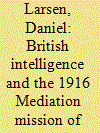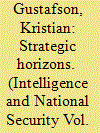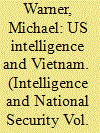| Srl | Item |
| 1 |
ID:
101128


|
|
|
|
|
| Publication |
2010.
|
| Summary/Abstract |
Colonel Edward M. House, the close personal confidant of American President Woodrow Wilson, disembarked in Great Britain in January 1916 on a mission to bring the First World War to a close under the auspices of American mediation. Although his mission, which culminated in a secret pact between the United States and Great Britain known as the House-Grey Memorandum, has been studied by several scholars, the involvement of British intelligence with respect to that mission has never received more than cursory attention. Through a careful analysis of the surviving documents, this article reconstructs British intelligence's activities with respect to House's mission, examines the countermeasures that House employed as he attempted to protect the secrecy of his negotiations, delineates the role played by different British intelligence agencies and assesses their response to their findings.
|
|
|
|
|
|
|
|
|
|
|
|
|
|
|
|
| 2 |
ID:
101126


|
|
|
| 3 |
ID:
101124


|
|
|
|
|
| Publication |
2010.
|
| Summary/Abstract |
The article deals with the role and benefit added by the use of horizon scanning in intelligence analysis in the UK. It asserts that horizon scanning as a technique, while not entirely akin to the tradecraft of intelligence analysis, has much to contribute to its success. Specifically, is asserts that a horizon scanning function in the JIO and the Cabinet Office should be made permanent, as bureaucratic tumult in the wake of the 2010 SDSR have left the capability un-staffed, though still established. Within the UK intelligence community, such an organization may have positive roles to play in the processes of challenge, the setting of collection priorities, and overall long-term UK intelligence assessment at the national level.
|
|
|
|
|
|
|
|
|
|
|
|
|
|
|
|
| 4 |
ID:
101127


|
|
|
|
|
| Publication |
2010.
|
| Summary/Abstract |
n recent years, and particularly around the time of his birth-centenary in 2003, George Orwell's reputation has come under a cloud. Both his unexampled honesty as a writer and his stainless political idealism have been brought into question. This article takes a further tentative step into this hitherto forbidden region by exploring the connections of Eric Blair and Eileen O'Shaughnessey with various espionage agents and intelligence networks in Barcelona in the spring of 1937. Although the argument is founded on a range of original contemporary documentation, as with many Spanish Civil War stories, facts are complicated and conclusions necessarily provisional.
|
|
|
|
|
|
|
|
|
|
|
|
|
|
|
|
| 5 |
ID:
101125


|
|
|
|
|
| Publication |
2010.
|
| Summary/Abstract |
Recent declassifications of the official histories of Central Intelligence Agency and National Security Agency activities in the Vietnam War give historians a sharper outline of the overall American intelligence effort in that conflict and a trove of supporting details. While scholars will have to use the new releases with caution, the histories (when combined with appraisals from the Armed Services) offer glimpses of the scale of the US intelligence program and some of the complications that hindered its effectiveness. Two particular features stand out when these materials are viewed in conjunction: the disconnectedness of the various agencies' and Services' efforts from each other (and from decision makers in Washington); and the difficulties that all of them had in working with America's South Vietnamese allies. The picture emerging is thus one of a congeries of largely independent intelligence campaigns working simultaneously against the North Vietnamese and Viet Cong targets. Intelligence miscues did not lose the Vietnam War for the Americans and South Vietnamese, but it now seems clearer that they made victory less likely.
|
|
|
|
|
|
|
|
|
|
|
|
|
|
|
|